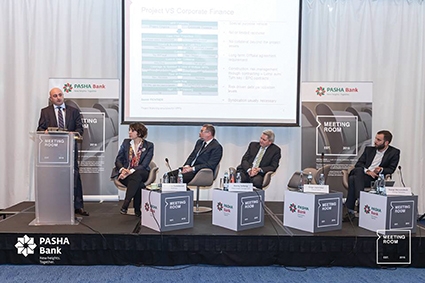Pasha Bank Holds Conference on Sustainable Energy Development in Georgia
The second business conference hosted by Pasha Bank within the framework of MEETING ROOM focused on the topic of ‘Sustainable Energy Development in Georgia - The Case for Hydro Power Plants,’ on December 6 at the Radisson Blu Iveria Hotel, Tbilisi.
The participants of the conference discussed topics related to the development, perspectives and challenges the sphere faces today, bringing together state officials and representatives of the private sector to discuss pricing and policy regulations, financing of Hydro Power Plants (HPP), business ethics and corporate social responsibility, experiences of working in the energo sector in Georgia, and policy trends.
Mariam Valishvili, Deputy Minister, Ministry of Energy of Georgia, talked about the policy trends in promoting sustainable energy development in Georgia.
“Sustainable Energy development has vast perspectives in our country; it’s a resource that we still have to use; technology that we still have to implement. The market is gradually increasing, which will hopefully bring us to the standards existing in European countries. State policy will focus on supporting the investments needed for the sector,” she said.
Giorgi Pangani, Commissioner of the Georgian National Energy and Water Regulatory Commission, made a presentation on pricing policy and regulations in the electro energy sector, followed by Ketevan Sandroshvili, Head of the International and Investor Relations Department at the Electricity Market Operator (ESCO), who talked about ESCO functions. “Our main challenge today is to create a platform and technical infrastructure for commercial trade principals. It’s very important to have all the market players involved,” she emphasized.
Giorgi Abramishvili, Managing Partner of Energy Solutions, also spoke of the development potential in Georgia, and went on to introduce his company, which specializes in hydro project management, development, research and consultancy in the hydro sphere.
“Georgia has so many possibilities in Hydro; you should invest in it, understanding of course that you should not contribute to ruining the environment and nature by doing so,” said Radoslav Dudolenski, Chief Executive of Hydrolea. “Understanding the long-term impact of investment in hydro power is essential, as is the need to build the right infrastructure.”
The Shuakhevi HPP project being carried out by Adjaristskhali Georgia LLC is the first hydropower project in Georgia to be certified by the United Nations Framework Convention on Climate Change to reduce carbon emissions. "Shuakhevihesi" is to produce 450 million kilowatt / hour electricity and reduce greenhouse gas emissions by more than 200,000 tons per year. After completion of the Shuakhevi project, Georgia will have a 187 MW worth capacity clean energy producing plant which will generate enough electricity for the entire population of Georgia throughout winter and summer. When the capacity for generating electricity is greatest, Georgia will export its energy to Turkey.
“Ours is one of the largest investments in the hydro business in Georgia,” Ronny Solberg, CEO, Adjaristskhali Georgia LLC, said. “We’re finishing the project in January-February 2017 and will begin integration in March. We are building 37.5 kilometres of transfer tunnels, probably the longest ones in the Black Sea region.”
Solberg also touched on business ethics and corporate social responsibility in his talk: “We’re very focused on taking care of the environment around us. Safety is an issue that we discuss every day; we have integrity, and we keep our promises,” he said.
“Every roof can become a generator,” Hydrolea’s Dudolenski said. “The cost of Solar panels is going down, so sooner or later people will see it’s cheaper to have solar energy and even sell it. Shopping malls often use hydrogen and they can even produce their own electricity, this is also the risk that I see for my generation,” he added in his talk about the risks and trends of the market that may affect investment possibilities in the sphere.
The last part of the conference focused on the financing practices of Hydro Power Plants and was presented by Goga Japaridze, CCO, Member of the Board of Directors, Pasha Bank.
The conference was supported by the Ministry of Energy of Georgia, Electricity System Commercial Operator and the Georgian National Energy and Water Regulatory Commission.
Nino Gugunishvili











